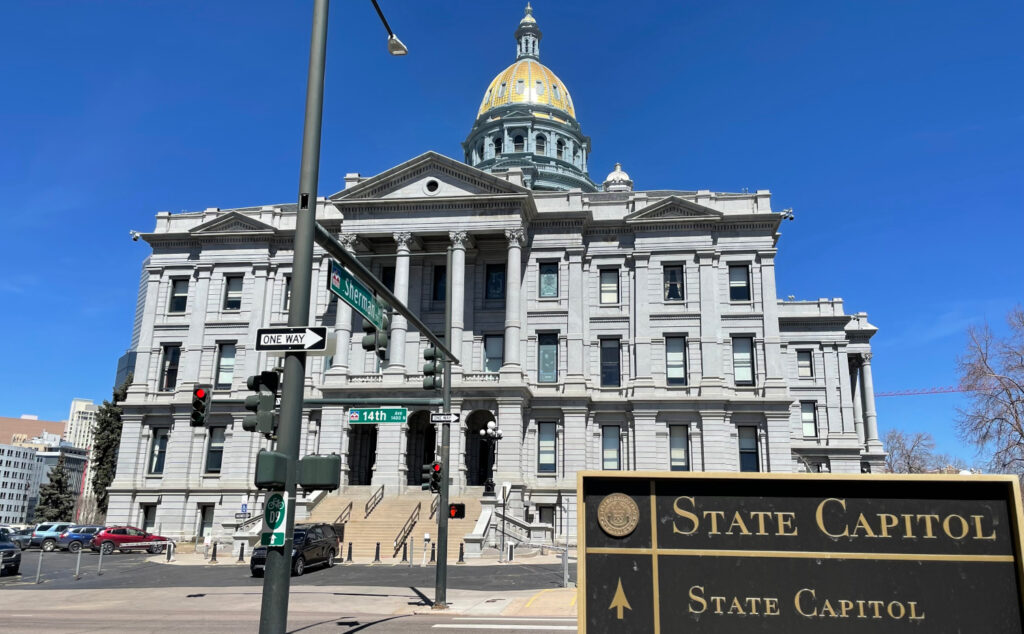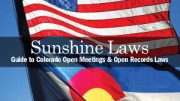By Jeffrey A. Roberts
CFOIC Executive Director
Two Republican lawmakers introduced a bill Wednesday that would undo open meetings law exemptions for the General Assembly enacted last year and make a host of other changes to Colorado’s government transparency statutes.
Several issues addressed in House Bill 25-1242 have been highlighted by the Colorado Freedom of Information Coalition in recent years and have come up during meetings of a broad group of stakeholders considering a state constitutional “right to know” ballot initiative for 2026. CFOIC is participating in those meetings but was not involved in the drafting of the bill.

The wide-ranging legislation would reform the Colorado Open Meetings Law, the Colorado Open Records Act and the Colorado Criminal Justice Records Act. Brought by Rep. Lori Garcia Sander of Eaton and Sen. Byron Pelton of Sterling, it does not yet have a Democratic sponsor in the Democratic-controlled legislature and has been assigned to the House State, Civic, Military & Veterans Affairs Committee (sometimes referred to as a “kill committee”).
The first part of HB 25-1242 repeals the open meetings law exemptions passed and signed into law by Gov. Jared Polis in March 2024, ironically during Sunshine Week, the annual national celebration of federal and state open-government laws.
That measure, Senate Bill 24-157, narrowed the definition of “public business” as it applies to the legislature and it lets state lawmakers communicate by email and text message without having to worry about violating the open meetings law, which is supposed to ensure that “the formation of public policy is public business and may not be conducted in secret.” Majority Democrats in both chambers used the new definition of public business to exclude reporters from caucus meetings before a special session on property taxes last August.
The Garcia Sander/Pelton bill also addresses the charging of exorbitant fees to process CORA requests, which can make public records unaffordable for some requesters. CFOIC has identified nearly 1,500 state agencies and local governments that have raised their research-retrieval fees since the new maximum hourly rate of $41.37 went into effect last July 1.
The bill would make the first five hours of research and retrieval free of charge to a requester (currently only the first hour must be provided for free). It also caps the hourly rate at $25 and allows a $50 fee to be imposed for an attorney’s review of records for attorney-client privileged information.
The “reasonable” time for a records custodian to set the inspection of records not readily available would be changed to five days from three working days or less, and that period could be extended an additional seven days if extenuating circumstances exist.
A requester would be required to provide the government entity with “an affidavit of service” that includes the date of the request and whether it was submitted in person, by mail or by electronic means. “The affidavit of service creates a rebuttable presumption of the date that service was made on the custodian by the requester,” the bill says.
HB 25-1242 also:
- Clarifies that CORA’s personnel files exemption does not “prevent the public inspection of any writings that reflect or discuss the exercise of official government functions by any public employee.” Only a public employee’s home address, home telephone number, personal cell number, personal email address and personal identifying information could be redacted.
- Changes the definition of “official action” records that must be provided to requesters under CCJRA to include “any incident report or other record of an interaction between any peace officer, while on duty, and any member of the public.”
- Makes all completed internal affairs investigative files, not just those that examine a law enforcement officer’s alleged misconduct involving a member of the public, available for inspection under CCJRA within 21 days of a request.
- Makes the first five hours of research and retrieval free under CCJRA and caps the hourly rate at $25. Currently, law enforcement agencies are allowed to charge “reasonable fees, not to exceed actual costs” to process records requests. The bill also would let them charge $50 for an attorney to review records for attorney-client privileged information.
- Requires the awarding of court costs and attorney fees to prevailing applicants in CCJRA lawsuits. Currently, costs and attorney fees are awarded only if a court finds a denial was “arbitrary or capricious.”
- Requires the online Peace Officer Standards and Training database to be “sortable” as well as searchable.
A separate CORA measure, introduced by Democratic Sen. Cathy Kipp of Fort Collins, is scheduled to be heard Feb. 20 in the Senate State, Veterans & Military Affairs Committee.
Follow the Colorado Freedom of Information Coalition on X or BlueSky. Like CFOIC’s Facebook page. Do you appreciate the information and resources provided by CFOIC? Please consider making a tax-deductible donation.




